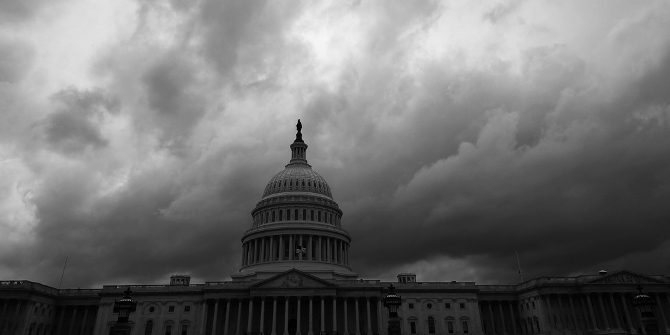USApp Managing Editor, Chris Gilson looks at the best in political blogging from around the Beltway. Our round-up of state blogs will follow on Saturday afternoon.
President Obama, the Democratic Party, and the GOP
This week saw some criticism levelled against the Democratic Party’s electoral strategies by conservative blogs. On Saturday, RedState writes that the party’s use of ‘War on Women’ rhetoric against the Republican Party doesn’t seem to be working, as a recent poll has found that women’s Democratic preference has shrunk to 47 percent, down from 51 percent in August. Meanwhile, The Daily Signal writes that the White House’s decision to postpone executive action on immigration until after the midterm elections shows that they see Hispanics as mere ‘electoral pawns’ by paying them lip service by delaying or avoiding decisions that would help them.
On Thursday, National Journal looks at the gaffes of Vice-President Joe Biden, after he came under criticism for referring to people who sold bad loans to service members as ‘Shylocks’. They say that Biden has a long history of saying the wrong thing, but has avoided any serious, career-killing backlashes over the years.
Moving to potential presidential candidates for the 2016 election, PoliticusUSA writes that the GOP should ‘tremble’, after former Secretary of State, Hillary Clinton made an impressive speech whilst attending the Harkin Steak Fry in Iowa. One potential challenger for Clinton from the left is Senator Bernie Sanders (I-VA). Outside the Beltway writes that Sanders stated this week that he is considering a presidential run in 2016 as either an independent or a Democrat. They say that while Sanders is an ‘interesting character’, he would be a mere nuisance for Clinton.
Moving to the Republican Party, on Tuesday, National Review’s The Campaign Spot report that Louisiana Governor Bobby Jindal is considering running for the Oval Office as well.
Daily Kos says that Republican, Mike Walker, may well be up for their award of ‘America’s Dumbest Congressman’, if he wins his race in North Carolina’s 6th Congressional District in November. They say that Walker recently stated that the U.S. should, in response to undocumented immigrants from Mexico, “go laser or blitz somebody“.
The Midterm elections
With the House of Representatives widely believed to be virtually impossible for the Democratic Party to retake this election cycle, attention is closely focused on the Senate, which polls have indicated that the Republican Party has a chance of retaking at the election. On Monday, Roll Call’s At the Races writes that Democrats have a plan to overcome President Obama’s poor approval ratings in Red States. They say that Democratic campaigners will be emphasizing candidates’ and incumbents’ individual profiles. While polls up to this point have generally favored the GOP to retake the Senate, some forecasts are now more optimistic about the Democrats’ chances. The Monkey Cage writes that they are now more favorable to the Democrats because they are now weighting polls more than the ‘background fundamentals’, and that the ‘midterm penalty’ may be smaller this year than in previous election cycles.

Many commentators opined this week on the lack of an apparent ‘wave‘ for the Republicans this year. Daily Kos writes on Sunday that the fact that Mark Schauer may have a chance at unseating the Republican Governor of Michigan, Rick Snyder, is an illustration that there is no wave, as he is much closer to Snyder in the polls than Snyder’s previous challenger who lost by 18 points in the 2010 GOP wave election. Crooks & Liars writes this week that the GOP are ‘counting their Senate chickens’, making plans for what they might do if they retake the chamber in November. Meanwhile, Outside the Beltway writes that we may not even know who controls the Senate until January, when Congress reconvenes. They say that given that nine races are toss-ups, recounts may well occur, which could take weeks to solve. They also say that there may be a run-off election in Louisiana in December, if neither candidate gains more than 50 percent of the vote on Election Day.
On Tuesday, Roll Call’s At the Races writes on a new report released by the Federal Election Commission this week that finds that Congressional candidate spending has decreased for 2014. They say that candidates have spent $767 million as of June 30th, compared to $1.2 billion at the same point in 2012.
This week, Rothenblog looks at what he says is the ‘amazingly static House playing field’. He writes that even after a year of campaigning, the House field is virtually the same as it was a year ago. Only 48 House races are now listed as competitive, down from 68 in 2010. With the Houseso static, National Journal looks at the funding gap that has emerged for the Republicans, as money is funneled towards Senate races. They say that some House Republicans are worried that their House majority may not be large enough for the 2016 elections, where the Democrats are expected to perform well on the back of Hillary Clinton’s pulling of more voters to the polls.
Government, the Beltway and Congress’ agenda
On Monday, The Daily Signal writes that one of President Obama’s greatest legacies may well be his remaking of the Federal Courts. They say that now that the Senate’s filibuster for judicial appointments has been removed, the Senate has confirmed twice the number of judicial nominees than George W. Bush did in his second term. Meanwhile, Daily Kos writes that if the Republican Party is able to retake the Senate in November, then this is likely to stymie Obama’s more than 150 pending nominations, given that there is unlikely to be enough time this week for them to be debated and voted on this week before Congress breaks up prior to the elections. FiveThirtyEight also casts its eyes ahead this week to after the midterms, writing that the diversity gap in the House is likely to be even wider than it is currently, where 89 percent of House Republicans and 47 percent of House Democrats are white men.
Hillary Clinton has long been criticized by conservative groups for her time as Secretary of State, which included the deadly attacks on the U.S. mission in Benghazi, Libya in 2012. The Lonely Conservative reports this week that a former State Department diplomat has alleged that Clinton’s aides withheld damaging documents from those investigating the Benghazi attack. This week also saw hearings into Benghazi begin by a GOP-led select committee. The American Prospect writes that the committee may go about its work responsibly, but the odds are on it becoming a ‘full on circus’, with Republicans on the committee looking like ‘crazy people’.
On Wednesday, Wonkblog reports that the Federal Reserve has released this week, details of its plans to reverse its six year long stimulus campaign, as the economy continues to show signs of recovery.
This week the House voted to give President Obama the authority to arm and train rebels in Syria, and to fund the government until December 11th, writes Roll Call’s 218. Meanwhile, RedState gives a guide to the War Powers Resolution and the constitutionality of the use of force more directly against the forces of the Islamic State in Iraq and Syria (ISIS). On Thursday, United Liberty writes that Senate Democrats have decided to delay voting on authorizing the use of military force against ISIS until after the midterm elections. They argue that this is because they do not want to upset their base, who may not be happy to see the U.S. enter into another Middle Eastern war. PoliticusUSA is similarly critical of House Republicans, who they say have set the stage for another government shutdown battle with Obama in December. They say that if the GOP does win the Senate, then the current GOP House Minority leader Mitch McConnell “is planning on using the budgetary process and government shutdowns to invalidate the entire Obama presidency”.
Foreign policy, defense and trade
On Sunday, The Feed writes on how the fact that oil prices have recent fallen below $100 a barrel is a geopolitical boon for the U.S. They say that the U.S. boom in shale gas production should take some credit for warding off price spikes from the wake of recent conflicts in the Middle East.
On Monday, Crooks & Liars reports that President Obama has committed to sending 3,000 military personnel to Africa to fight the Ebola virus. They say that it is a better way to deploy America’s military.
Much of this week’s commentary on political blogs revolved around Obama’s strategy to deal with the Islamic State. On Saturday, RedState writes that the Obama Administration lied about the situation in Iraq by not using civilian deaths a metric to judge the level of violence in the country, and that it was aware that the situation had been deteriorating for three years and chose to ignore it. On Tuesday, Political Violence @ a Glance writes that the U.S. will not declare war on ISIS, simply because the U.S. lacks a way to declare war against non-state actors, and that even if it could, this would accord ISIS the legitimacy and rights of the states that are fighting to keep them from gaining. Even if it is technically not a ‘war’, The American Prospect writes on why this ‘war’ will be unaccountable, after Congress’ vote this week, They say that while on the surface it looks like Congress is accepting responsibility for the new engagement, there will be no accountability for anyone other than Obama, especially given how multifaceted U.S. involvement is and is likely to be. On Wednesday, The American Interest writes on the coalition ‘that isn’t’, after futile attempts by Secretary of State John Kerry to get Arab states like Turkey and Saudi Arabia to put troops on the ground to fight ISIS forces.
Obamacare and health policy
On Sunday, Daily Kos writes on the still too-high costs of health insurance, even after the introduction of the Affordable Care Act. They say that not only have premium hikes outstripped wage rises, the deductibles in many plans are increasing as well. They say that while Obamacare and the associated expansion of Medicaid have done people some good, further healthcare reforms are still needed. Wonkblog takes some time this week to look at how Obamacare has decreased the number or people without health insurance. They say that while the latest CDC survey data shows that the uninsured rate is falling, it does not capture the full impact of Obamacare because it does not account for the late surge of signups during the enrollment period.
Hit & Run has a less positive take on Obamacare, writing on Tuesday that since the law includes a three-month grace period where insurers must cover patients who sign up, but don’t pay the price of their premiums, some patients are simply not paying, leaving healthcare providers stuck with the tab for claims from those first three months. Meanwhile, The Daily Signal reports that a new Government Accountability Office has concluded that security weaknesses in the Healthcare.gov website (the online arm of Obamacare), are putting the sensitive personal information the site contains at risk. Despite the disastrous rollout of the website and Obamacare as a whole last year, it has faded as an election issue this year, writes Outside the Beltway. They say that this is largely down to the fact that there has been little bad news – or even news at all – about Obamacare since open enrollment ended in March.
The economy and society
On Sunday this week, PoliticusUSA reports on the ‘downgrade frenzy’ caused by Republican economic policies in states across the country. They say that New Jersey, led by Republican Governor, Chris Christie, has just had two more credit downgrades from ratings agencies S&P and Fitch – making a total of eight since Christie took office in 2010. They say that other states such as Kansas and Michigan have also suffered similar downgrades after revenue shortfalls and sluggish economic growth due to tax cuts for the rich. On Tuesday, The Lonely Conservative points out that liberal policies may not be good for states either, pointing out that the state of Illinois has created twice as many food stamp recipients as jobs since the start of the Great Recession in 2008.

Does anyone like the practice of tipping? The Atlantic confirms this week that tipping is a terrible way to pay people, and that the elimination of the ‘tipped minimum wage’ (which allows service workers to be paid only $2.13 an hour) would go a great way towards improving the lives of these workers.
Wonkblog writes this week that the imprisonment rate in the U.S. has fallen for the fifth straight year. They say that 2013 marked a ten year low in incarceration, and is a trend that is likely to continue, as the public gets less punitive, and liberals and conservatives agree that mass incarceration is inhumane and expensive. Hit & Run reposts on something else that is falling – heroin use. They say that while the number of people using the drug has been dropping, media concern about a ‘heroin epidemic’ continues to skyrocket.
And finally…
The Atlantic reports on a new study that shows that Americans work longer hours, and are more likely to work late at night and on weekends.
Wonkblog maps the states that produce the greatest number of Miss America winners – states like New York and California top the list with six each.
The White House Dossier takes the opportunity of Hillary Clinton’s attendance at Senator Tom Harkin’s annual steak fry in Iowa to remind readers that when (then Senator) Barack Obama attended in 2007, he looked somewhat unpatriotic.
Featured image: Vice President Joe Biden Credit: jstreetdotorg (Flickr, CC-BY-NC-SA-2.0)
Please read our comments policy before commenting.
Note: This article gives the views of the author, and not the position of USApp– American Politics and Policy, nor of the London School of Economics.
Shortened URL for this post: http://bit.ly/1v0gaYf






